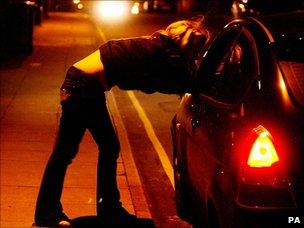EU beefs up law against human trafficking
- Published

Many women are trafficked across the EU by gangs profiting from prostitution
The EU has , extending punishment to those who help the smuggling gangs.
Jail sentences for the most serious offences will be at least five years, rising to 10 where there are also aggravating circumstances.
The tougher measures to combat sexual exploitation and forced labour were passed by a large majority of Euro MPs.
The UK opted out of the new law, being wary of EU judicial powers, but UK Conservative MEPs still voted for it.
Denmark also opted out.
"The EU's directive is not perfect but, given the stakes, we decided to give it our support," said Marina Yannakoudakis, MEP of the European Conservatives and Reformists (ECR) group.
She stressed that criminal law "remains a matter for national governments" and the directive "comes close to the red line, but I believe it no longer crosses it".
The directive defines "exploitation" more broadly than the EU decision of 2002 which it replaces. The 27 member states have two years to put it into effect.
Human trafficking will now include "instigating, aiding, abetting or attempting" to commit the offence.
In cases where the perpetrator is a legal entity, the possible sanctions will include fines, exclusion from public funding or permanent closure of organisations.
Victims of human trafficking will be entitled to a range of support under the new directive, including medical and psychological treatment and legal aid - free of charge if they have insufficient funds.
According to the European Parliament, several hundred thousand people are trafficked into or within the EU each year. Some 43% are exploited for prostitution and 32% for menial labour.
- Published21 November 2010
- Published12 November 2010
- Published25 October 2010